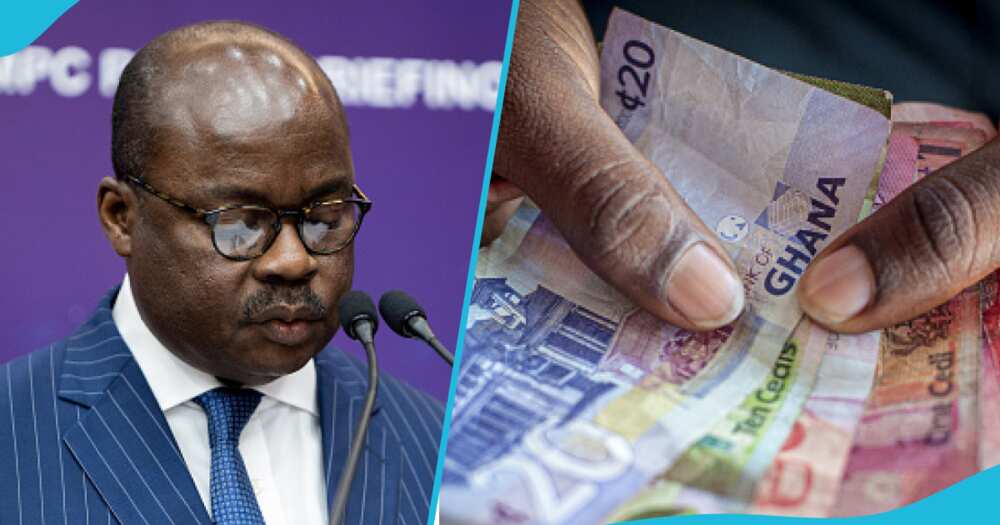In a strategic financial move to shore up the short end of the market, the Bank of Ghana (BoG) successfully mobilized a substantial GHS 1.43 billion through the issuance of its own bills, specifically designated as Bank of Ghana (BoG) bills.
The auction, featuring the 56-day maturity bill, not only addresses short-term financing requirements but also directly contributes to government funding.
While the detailed breakdown of bids from commercial banks and asset management firms remains undisclosed, the overall success of the Central Bank’s endeavor introduces an element of anticipation into the financial landscape. The auction results report discloses a notable aspect—the bills were auctioned at a discernible interest rate of 29.9 percent.
Operating as a linchpin within Open Market Operations (OMO), the Central Bank bill stands as a crucial monetary policy instrument. It plays a pivotal role in managing liquidity dynamics within the Ghanaian banking system, offering short-term securities through primary auctions.
The assign’d interest rate of 29.9 percent holds paramount significance, influencing the broader monetary policy stance of the country. With maturity periods ranging from 14 to 182 days, the Central Bank bill emerges as a versatile instrument, enabling the BoG to navigate and shape Ghana’s monetary environment with precision.
The successful mobilization of GHS 1.43 billion underscores the confidence and trust in the Central Bank’s financial acumen. As the BoG continues to employ strategic financial instruments, it reaffirms its commitment to maintaining stability, liquidity, and effective monetary policy in Ghana’s dynamic economic environment.
Investors and financial analysts eagerly await further insights into the impacts and implications of this dynamic financial maneuver by the Bank of Ghana. The achievement not only meets short-term financial needs but also highlights the Central Bank’s pivotal role in steering the economic trajectory of the nation.
Utilization of the Funds to Have a Ripple Effect Across Various Sectors
The utilization of the funds raised will likely have a ripple effect across various sectors, potentially fueling economic growth and development initiatives, especially when Christmas is around the corner.
Additionally, the success of this auction positions the BoG as a key player in navigating the challenges and opportunities presented by the ever-evolving financial landscape, showcasing its adaptability and strategic prowess in ensuring the stability and resilience of Ghana’s financial ecosystem.
The BoG’s success In the short term debt instrument despite the overall drawback of the economy reinforces Ghana’s standing as a financially prudent and resilient player, attracting positive attention from international investors and financial institutions.
In the intervening time, the mobilization of this significant funds by the Bank of Ghana not only enhances the country’s fiscal strength but also underscores its commitment to prudent financial management amid a rapidly changing economic landscape.
As the nation continues its journey towards economic prosperity, such strategic financial initiatives are instrumental in fortifying its position on the international stage and fostering sustained growth.
A short-term debt security auction is a financial market process where government or corporate short-term debt instruments are sold to investors. These auctions are conducted regularly to meet financing needs. Investors bid on the securities, specifying the interest rate they are willing to accept. The highest bidder receives the security at their proposed rate, and this sets the overall interest rate for the issued securities. Short-term debt securities are attractive to investors seeking low-risk, liquid investments for short durations.
These auctions play a crucial role in managing the government’s or a corporation’s cash flow and funding requirements. The ability to efficiently raise capital through short-term debt securities provides flexibility and ensures timely financial operations. Investors, on the other hand, find these auctions appealing for their safety and short-term nature, allowing them to quickly access their invested funds.
The interest rates determined through these auctions also serve as indicators of market sentiment and economic conditions, influencing broader financial markets. Overall, short-term debt security auctions serve as a vital mechanism for balancing the financial needs of both issuers and investors in the short-term financial landscape.
READ ALSO: UNDP Engages Stakeholders On Agriculture Value Chains To Tackle Violent Extremism




















